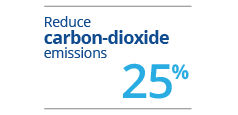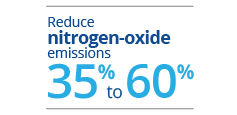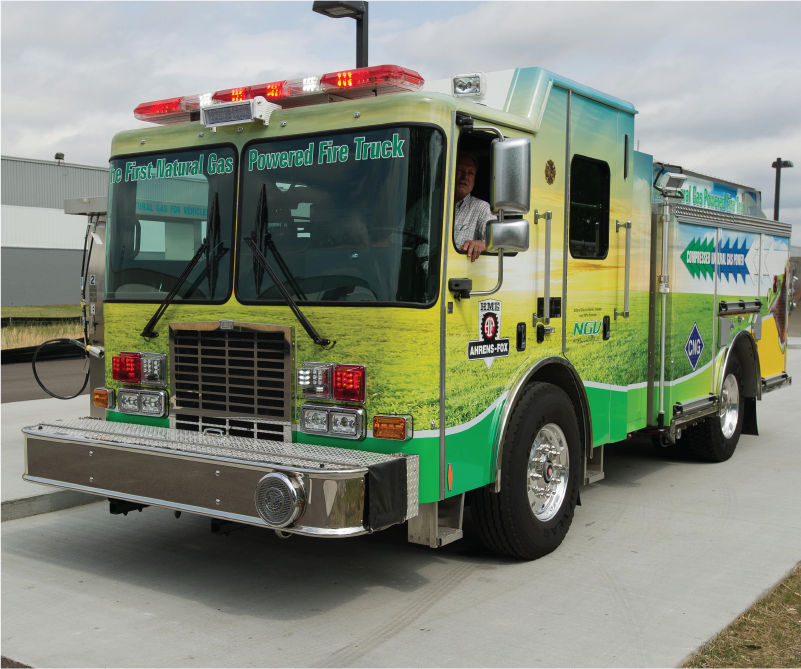Compressed Natural Gas Vehicles
Natural gas is the cleanest burning fossil fuel. This is good for the environment we all share, of course, but consumers will appreciate that your company is doing its part to be a good corporate citizen.
What Is a Compressed Natural Gas Vehicle?
Simply put, a compresssed natural gas vehicle (CNG) is a car, van or truck powered by natural gas instead of gasoline or diesel fuel. You can buy a new CNG vehicle from many auto manufacturers or have an existing gasoline-powered vehicle converted to run on compressed natural gas.
CNG hybrids can run on both natural gas and gasoline as needed. These bi-fuel vehicles offer true flexibility and extended range, enabling companies to operate almost anywhere, even if a compressed natural gas refueling station isn’t nearby.
Compressed Natural Gas Vehicle Benefits
Reduced Fuel Costs
An equivalent gallon of natural gas costs, on average, about one-third less than conventional gasoline or diesel at the pump. It also costs less than other fuels, including ethanol, methanol and propane.
Reduced Maintenance Costs
Servicing a fleet can be a major expense. Natural gas burns cleaner than gasoline, CNG vehicles can go longer between oil changes and engine tune-ups.
Extended Vehicle and Part Life
Natural gas causes less wear and tear on vehicles. It does not adversely affect metals the way gasoline and its exhaust does, so pipes and mufflers last longer. CNG vehicles also experience less knocking and no vapor locking. They also start up and drive more smoothly.
Reduced Maintenance Costs
Natural gas is an ideal fuel for vehicles. On average, the carbon footprint for an CNG vehicle will be 25 to 28 percent less than its gasoline or diesel-powered equivalent. According to the Environmental Protection Agency, compressed natural gas vehicles also:
- Potentially reduce non-methane hydrocarbon emissions 50 to 75 percent
- Emit fewer toxic and carcinogenic pollutants
- Emit little or no particulate matter
- Eliminate evaporative emissions



Energy Independence
Compressed natural gas vehicles can reduce our reliance on imported oil and increase energy security. The United States owns abundant natural gas reserves. As a matter of fact, about 86 percent of the natural gas currently used in the U.S. comes from domestic sources. Most of the remaining demand is met by Canada.
New drilling technologies also make it possible to tap unconventional natural gas deposits. It's estimated that domestic reserves are sufficient to meet U.S. natural gas demand for more than 100 years, making natural gas a long-term solution for reducing our dependence on foreign energy sources.
Easy to Refuel, Safe to Drive
CNG vehicles are as easy to refuel as gasoline or diesel vehicles. They are safer to operate too.
Fleet Advantages
One compressed natural gas vehicle can make a big difference, so imagine the benefits applied across an entire fleet. Whether you’re using it as a complement to your gasoline, diesel, hybrid and electric vehicles or as a complete retooling of your operation, CNG vehicles are a proven, road-ready technology that maintains the environment as it strengthens your bottom line.
What Fleets May Benefit Most From CNG vehicles?
Companies and services that operate in urban areas are ideal candidates for compressed natural gas vehicles, especially those that use vehicles with poor fuel efficiency and rack up miles every day. Some of these businesses and services include:
- School districts and transit systems
- Airports and hotels offering shuttle van service
- Waste haulers that use collection, recycling and transfer vehicles
- Commercial delivery fleets, such as for food, newspaper and package delivery
- Municipal, state and federal governments.
DTE Energy, in fact, is a perfect example of an operation enjoying the advantages of a natural gas fleet. In 2010, we began replacing our service vans with new CNG vehicles. Today, we have over 250 CNG vehicles on the road. Not only has this improved our efficiency, it’s given us invaluable insight to help companies make the switch to compressed natural gas vehicles.
A Safe Investment
In daily operation, compressed natural gas vehicles are safer to use than gas-powered vehicles. Their fuel systems are sealed to prevent spills and evaporative losses. Compared to typical gas tanks, CNG fuel storage cylinders are also much stronger and provide better crash protection, making accidental ignition or combustion unlikely.
In the unlikely event of a leak, the natural gas would dissipate harmlessly into the air. Gasoline, on the other hand, pools on the ground, creating a fire hazard. Natural gas also is non-toxic and will not contaminate groundwater.
Calculate Your Potential Savings

Compressed Natural Gas Vehicles Savings Calculator
Carbon Emissions Savings Calculator

Learn More About Compressed Natural Gas Vehicles
If transportation is an essential element of your operations, natural gas vehicles can decrease costs and increase efficiency. To see how DTE Energy can help you switch a vehicle or an entire fleet to run on natural gas, call 888.FUELNGV (888.383.5648).
The Natural Gas Vehicle Coalition is also a trusted resource for learning about the potential of compressed natural gas vehicles. The Alternative Fuels Data Center offers a wide range of data, research and study focused on alternative transportation technologies. For even more educational background about CNG vehicles and compressed natural gas, be sure to visit CNG Now!
